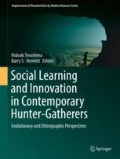Abstract
In this paper, the author presents a picture of early social development in infants growing up in a Baka hunter-gatherer community in eastern Cameroon. Interviews performed using the DESC confirmed that Baka mothers were aware of their infants’ development in social cognition. They demonstrated joint attention with their infants and provided scaffolding as they learned about objects in their environment. Infants’ ability to distinguish strangers from strangers and fear of strangers developed earlier than reported for Japanese infants. The rapid onset and stabilization of social cognition early in infancy suggests scaffolding, and mother-infant reciprocal exchanges are important in the development of communication and language.
References
Bogdan (2014) Scaffolding early acquisition in communication and language: intuitive psychology as mind designer. Forty-fourth annual meeting of the Jean Piaget Society. Plenary 2, San Francisco, 29–31 May 2014
Bruner J (1983) Child’s talk: learning to use language. Oxford University Press, Oxford
Davis BL, Bedore LM (2013) An emergence approach to speech acquisition: doing and knowing. Psychology Press, London
Hagino I, Yamauchi T (2013) Daily physical activity and time-space of Pygmy hunter-gatherers’ children in Southeast Cameroon. In: Akazawa T, Ogihara N, Tanabe H, Terashima H (eds) Dynamics of learning in Neanderthals and modern humans, vol 2, Cognitive and physical perspectives. Springer, Tokyo, pp 91–98
Henrich J, Heine SJ, Norenzayan A (2010) Most people are not WEIRD. Nature 466(7302):29–29
Kaller T, Zuberbuhler K, Keller H, Slocombe KE (2014) Joint attention in wild chimpanzees and human infants: what is special about human communication? In: Invited symposium 4, Comparative perspectives on language and communicative development: joint attention, gestural communication, and nonlinguistic vocalizations in non-human primates and human infants. Forty-fourth annual meeting of the Jean Piaget Society, San Francisco, 29–31 May 2014
Meltzoff AN, Gopnik A (2013) Learning about the mind from evidence: children’s development of intuitive theories of perception personality. In: Baron-Cohen S, Tager-Flusberg H, Lombardo ML (eds) Understanding other minds: perspectives from developmental social neuroscience. Oxford University Press, Oxford
Morinaga R, Kakinuma M, Konno M, Mauzumi M, Nakaishi Y, Igarashi K (2011) Checklist for development of early social cognition. Bunkyo-Shiryo, Tokyo
Murakami T, Ohgami H (2007) The development of social cognition in infancy: joint attention, language, and social emotion. Kyushu Univ Psychol Res 8:133–142 (In Japanese)
Spelke ES, Kinzler KD (2007) Core knowledge. Dev Sci 10:89–96
Terashima H (2012) A study of human learning behavior among hunter-gatherers. In: Akazawa T (ed) RNMH project series, No.001, 37–41
Tomasello M (1999) The cultural origins of human cognition. Harvard University Press, London
Tomasello M (2009) Why we cooperate. MIT press, Cambridge
Acknowledgments
This study was supported by the “Grant-in-aid for Scientific Research on Innovative Areas 2010–2014, 1201.” The project leader is Takeru Akazawa, PhD. The title is Replacement of Neanderthals by Modern Humans: Testing Evolutionary Models of learning. I am grateful to the members of our Research Team A02 in the RNMH project, “A Study of Human Learning Behavior Based on Fieldwork among Hunter-Gatherers” (team leader; Hideaki Terashima) for supporting my research. I would also like to thank Hideaki Terashima, Koji Hayashi, Izumi Hagino, and Koji Sonoda for supporting this study.
Author information
Authors and Affiliations
Corresponding author
Editor information
Editors and Affiliations
Rights and permissions
Copyright information
© 2016 Springer Japan
About this chapter
Cite this chapter
Koyama, T. (2016). Early Social Cognitive Development in Baka Infants: Joint Attention, Behavior Control, Understanding of the Self Related to Others, Social Approaching, and Language Learning. In: Terashima, H., Hewlett, B.S. (eds) Social Learning and Innovation in Contemporary Hunter-Gatherers. Replacement of Neanderthals by Modern Humans Series. Springer, Tokyo. https://doi.org/10.1007/978-4-431-55997-9_20
Download citation
DOI: https://doi.org/10.1007/978-4-431-55997-9_20
Published:
Publisher Name: Springer, Tokyo
Print ISBN: 978-4-431-55995-5
Online ISBN: 978-4-431-55997-9
eBook Packages: Social SciencesSocial Sciences (R0)

